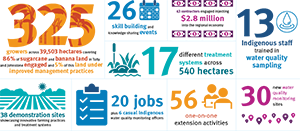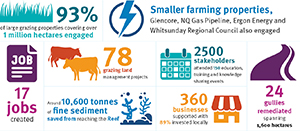Place-based integrated projects
The Queensland Government is funding over $13 million to continue the Queensland Reef Water Quality Program (QRWQP) investment in place-based approaches across the Great Barrier Reef catchment.
Reef Place-Based Integrated Projects (2023–2026)
The $5.5 million Reef Place-Based Integrated Projects initiative seeks to improve Reef water quality and add value to whole-of-catchment and local economies across a range of cross-sector settings.
Stage One of the initiative focused on developing regional collaboration between diverse stakeholders and sectors, while Stage 2 involved a call for projects through the Stage Two – Reef Place-Based Integrated Projects Grants Program. After a robust evaluation process, three projects were selected.
Herbert Integrated Project (HIP)
Location: Herbert, Wet Tropics
Delivery partner: Terrain NRM
The HIP takes a whole-of-catchment approach to improving water quality with a focus on improved land management, green economy and natural capital opportunities. It includes the development of a practical, collaborative and community driven implementation plan to prioritise actions and drive land management efforts and natural capital opportunities.
The project builds on existing capability and programs to increase land management change, in addition to identifying opportunities for landscape remediation and nature repair through streambank remediation, wetland and riparian restoration and in-drain wetland management.
Proserpine Integrated Project (PIP)
Location: Proserpine, Mackay, Whitsunday
Delivery partner: Reef Catchments
The PIP focuses on improving water quality while delivering co-benefits for the Proserpine, Mackay and Whitsunday catchments using a collaborative place-based, Whole-of-System Values Based Framework and circular material flows analysis.
It will achieve water quality improvements through circular economy approaches led by the aquaculture industry, the use of catchment pollutant treatment systems, reduction in pesticide use using artificial intelligence and practice change initiatives.
Mary River Integrated Project (MRIP)
Location: Mary River, Burnett Mary
Delivery partner: Mary River Catchment Coordination Association Inc.
The MRIP addresses nutrient and fine sediment pollution along strategic reaches and key landscapes of the Mary River through the delivery of a suite of programs targeting unsealed roads, riparian vegetation restoration and small area grazing.
It will also pilot the Upper Mary River Jinibara Water Quality Monitoring Program as well as the Water Quality Best Management Practice (WQ BMP) dairy farmer network program, which includes developing a dairy farmer-led water quality monitoring program.
The projects will be delivered through a place-based delivery model which responds to local needs and issues, and provides opportunities for the local community to contribute to the project design and delivery while also:
- supporting Reef water quality improvement
- leveraging and integrating investment, in-kind contributions and existing resources and initiatives
- engaging their local communities and land managers in agricultural land and catchment management, landscape remediation and agricultural supply chain, circular economy and natural capital opportunities
- promoting skills, increasing capacity and generating jobs to support regional growth, a green economy and natural capital projects
- providing enduring legacy outcomes.
Atherton Tablelands Integrated Collaboration
The Queensland Government and Sustainable Table have each committed $1.5 million toward the Atherton Tablelands Integrated Collaboration, a unique partnership to promote regenerative horticulture and Reef water quality outcomes.
Delivered by Sustainable Table from 2023–2028, the project:
- uses a grassroots approach to engage and support horticulture land managers across the Atherton Tablelands to encourage uptake of regenerative horticulture practices tailored to the local system and environment
- aims to develop an integrated food hub in the Cairns region, creating links across the agricultural supply chain and a closed-looped economy.
Burdekin Major Integrated Project: Landholder’s Driving Change (phase 2)
The Queensland Government has committed $3 million towards the second phase of the Burdekin Major Integrated Project (Burdekin MIP). This investment will continue to:
- engage graziers, other land managers and the community to reduce sediment run-off
- develop better understanding of land management and local water quality.
Burdekin Major Integrated Project Gully Maintenance and Monitoring
The Burdekin Major Integrated Project Gully Maintenance and Monitoring will see over $500,000 invested into monitoring and maintenance of the 24 gullies remediated as part of the Burdekin MIP for three years until 2025. Learnings on the long-term effectiveness and maintenance of gully remediation works will be shared with groups undertaking similar on ground projects.
Wet Tropics Local Scale Monitoring Program (phase 2)
The $3 million Wet Tropics Local Scale Monitoring Program focuses on water quality monitoring at sub catchment level, paddock demonstration sites and catchment repair monitoring in the Tully and Johnstone catchments.
The program will work in cooperation with the Great Barrier Reef Foundation Reef Trust Partnership Tully Johnstone Regional Water Quality Program to prevent dissolved inorganic nitrogen from entering the Reef.
The program will continue to monitor and engage landholders and the local community to better understand the impact of land management practices on local water quality.
Major Integrated Projects in the Burdekin and Wet Tropics (2017–2021)
The Burdekin and Wet Tropics Major Integrated Projects (MIPs) (2017-2021) were two major place-based projects that worked with agricultural producers, landholders and the local community to test a range of tools and approaches to improve water quality by reducing nutrients, sediment and pesticides flowing into waterways in the Burdekin and Wet Tropics regions.
The Burdekin MIP, known as Landholders Driving Change, worked with graziers in the Bowen-Broken-Bogie catchment in the Burdekin and was coordinated by NQ Dry Tropics. The Wet Tropics MIP focused on banana and sugarcane growers in the Johnstone and Tully catchments of the Wet Tropics and was managed by Terrain NRM.
Tailored to local needs, both projects had a catchment-wide focus and were designed from the ground-up with landholders and experts. They included a broad range of activities from water quality monitoring and practice change to catchment repair, gully remediation, incentives and extension.
In addition to the economic benefits including 31 jobs created and 318 businesses receiving work through the projects, the MIPs drove a change in landholder attitudes and a greater understanding of how their actions contributed to local water quality.


Snapshot
- 325 growers across 39,503 hectares covering 86 of sugarcane and banana land in Tully and Johnstone engaged 14 jobs plus 6 casual Indigenous water quality monitoring officers
- 43 contractors engaged injecting $2.8 million into the regional economy
- 16 different treatment systems across 540 hectares
- 38 demonstration sites showcasing innovative farming practices and treatment systems
- 13 Indigenous staff trained in water quality sampling
- 26 skill building and knowledge sharing events
- 56 one-on-one extension activities
- 30 new water quality monitoring sites.


Snapshot
- 93% of large grazing properties engaged, covering over 1 million hectares
- 45 smaller farming properties engaged along with Glencore, NQ Gas Pipeline and Whitsunday Regional Council
- 17 jobs including 6 regional jobs
- 78 grazing land management projects across 46% of grazing land in Bowen-Broken-Bogie
- 24 gullies remediated spanning 1,600 hectares
- Around 10,6000 tonnes less sediment per year entering the Reef
- 150 education, training and knowledge sharing events
- community water quality monitoring program supported.
More information
Please contact the Office of the Great Barrier Reef, Queensland Government for more information at OfficeoftheGBR@des.qld.gov.au


